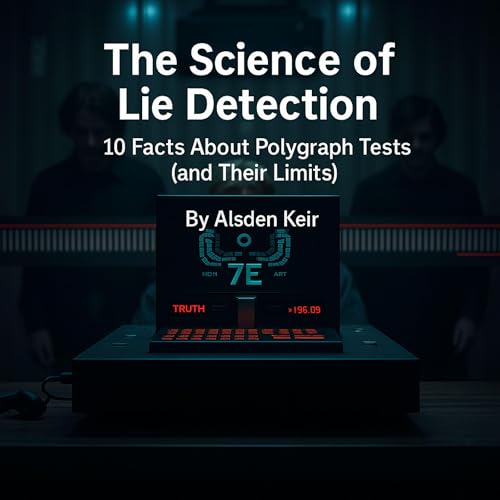
The Science of Lie Detection
10 Facts About Polygraph Tests (and Their Limits)
No se pudo agregar al carrito
Add to Cart failed.
Error al Agregar a Lista de Deseos.
Error al eliminar de la lista de deseos.
Error al añadir a tu biblioteca
Error al seguir el podcast
Error al dejar de seguir el podcast
 Exclusivo para miembros Prime: ¿Nuevo en Audible? Obtén 2 audiolibros gratis con tu prueba.
Exclusivo para miembros Prime: ¿Nuevo en Audible? Obtén 2 audiolibros gratis con tu prueba.Compra ahora por $12.28
-
Narrado por:
-
Elaine Frank
-
De:
-
Alsden Keir
For as long as people have lied, others have sought ways to uncover the truth. From ancient ordeals to modern technology, the quest for lie detection has fascinated, terrified, and shaped human society. Among all the methods devised, none has captured the public imagination quite like the polygraph test—the so-called “lie detector.” With its wires, sensors, and rolls of chart paper, the polygraph has become a symbol of justice in crime dramas and spy thrillers, a supposed scientific oracle capable of revealing guilt or innocence. But how much truth does it really uncover?
This book explores the science, psychology, and controversy behind polygraph testing. Far from being a flawless instrument of justice, the polygraph is better understood as a “stress detector” than a “lie detector.” It measures physiological changes—heart rate, breathing patterns, and skin conductance—that may be linked to deception but are not exclusive to it. Nervousness, fear, anger, or even the pressure of being under suspicion can all produce the same readings as a lie. This ambiguity is at the core of the ongoing debate about whether polygraphs are reliable science or clever theater.
Inside, you’ll discover ten essential facts that cut through the myths and present the polygraph for what it is—and what it is not. You’ll learn why questioning techniques matter more than the machine itself, why there is no universal “lying response,” and how skilled individuals can sometimes use countermeasures to manipulate results. The book also explores the examiner’s outsized role in shaping outcomes, showing how human judgment and bias can influence results as much as physiology.
The legal system’s unease with polygraph evidence is another central theme. In most courts, polygraph results are inadmissible because of doubts about their reliability, though they sometimes appear in employment screening, national security vetting, and law enforcement investigations. This raises difficult questions: Should a tool with such questionable accuracy be allowed to decide careers, reputations, or even freedom? Or is it better seen as a psychological lever—useful in interrogations for eliciting confessions, but dangerous if mistaken for scientific certainty?
The book doesn’t stop with criticism. It introduces more scientifically grounded alternatives, such as the “Guilty Knowledge Test,” which measures recognition of specific details only a guilty person would know. It also looks ahead to the future of lie detection in neuroscience and brain imaging, where researchers hope to bypass physiology altogether and probe the mind directly. These innovations are promising, but they raise ethical questions about privacy, free will, and the boundaries of science in human affairs.
Ultimately, The Science of Lie Detection is not about dismissing polygraphs outright, nor about glorifying them as foolproof instruments. Instead, it is about understanding their strengths, their limits, and their cultural significance. The polygraph is as much about psychology, persuasion, and belief as it is about wires and charts. For investigators, it can be a tool. For suspects, it can be an ordeal. For society, it is a mirror reflecting both our desire for certainty and the uncomfortable truth that certainty is often elusive.
Whether you are intrigued by crime investigation, fascinated by psychology, or simply curious about how societies try to separate truth from lies, this book will give you the knowledge to see polygraphs in their true light. The facts within will help you navigate the blurred line between science and pseudoscience, revealing why the polygraph endures in popular imagination even as its scientific foundations remain contested.
Lies are as old as humanity, and the longing to expose them is older still. The polygraph is only one chapter in that timeless story—but it is a chapter worth understanding in full.
©2025 Deep Vision Media t/a Zentara UK (P)2025 Deep Vision Media t/a Zentara UKEl oyente recibió este título gratis
Essential Reading for Critical Thinkers
Se ha producido un error. Vuelve a intentarlo dentro de unos minutos.
El oyente recibió este título gratis
Unmasking the Lie
Se ha producido un error. Vuelve a intentarlo dentro de unos minutos.
El oyente recibió este título gratis
A Clear and Insightful Look at Polygraphs
Se ha producido un error. Vuelve a intentarlo dentro de unos minutos.
El oyente recibió este título gratis
More Than Just Wires and Charts - A Deep Cultural
Se ha producido un error. Vuelve a intentarlo dentro de unos minutos.
El oyente recibió este título gratis
Truth and Tension
Se ha producido un error. Vuelve a intentarlo dentro de unos minutos.


